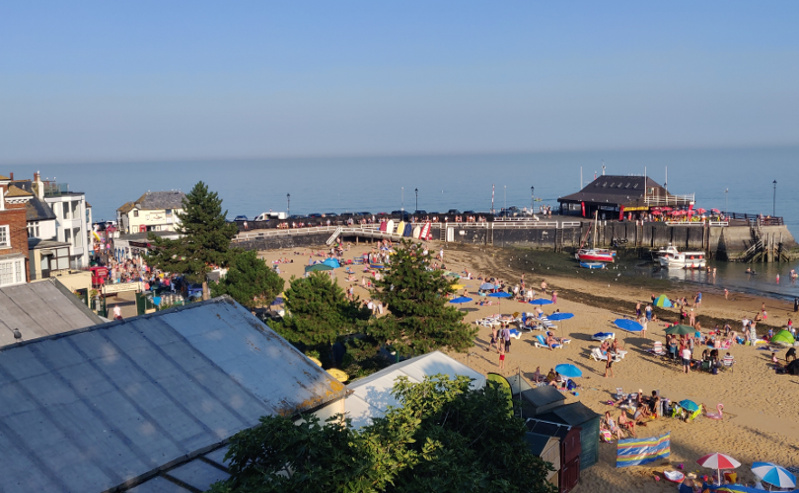
14 Jan How can seaside towns be reimagined as business locations?
Back in January 2019, our director, Diane embarked on an MSc in Place Management and Leadership with the Institute of Place Management based at Manchester Metropolitan University.
Diane has now reached the final stage of the course which is the dissertation. This has been through various development stages but with lockdowns and tiers it’s been more challenging than expected to reach people to interview or speak to businesses, understandable given the level of uncertainty around high streets and small businesses since March 2020.
What to research
With a long standing interest in seaside towns, Diane decided she would like to conduct research into how they function when the narrative is not around tourism. At The Assembly Line, many of our projects involve talking to high street businesses and the town’s stakeholders to build an understanding of the place, the aspects that work well and those that need improving. Often this work sits alongside resident groups and market traders too who are equally users of the town we are working in.
Thinking about seaside towns, Diane’s thoughts turned to: why are they so quiet off season (sometimes even of day trippers), what happens to people in seasonal jobs, if some shops are closed October to Easter how is the town serving its local population, why do people move there and how easy is it to start a business?
Diane was disappointed to hear that she couldn’t cover all of these aspects in one dissertation!
Settling on a title
While there is a wealth of material on the tourism industry and UK coastal towns in particular, there is very little focusing on the non-tourism economy and specifically on how towns can adapt to attract investment, support businesses and harness the power of entrepreneurs.
For this reason, Diane settled on researching seaside towns and the businesses within them, looking at four objectives:
To understand which coastal towns are successful in attracting investment and encouraging start-ups
To explore entrepreneur-led regeneration and its impact on stakeholder management/ relationships in coastal towns
To understand the contributing factors that lead businesses to locate in coastal towns
To identify the barriers that prevent coastal towns from diversifying
The official title is: What are the success factors in coastal towns to attract investment and can they be reimagined as business locations?
As with many aspects of life, Covid-19 has accelerated the changes that were taking place in coastal towns across the UK and this plays a factor in the research.
Featured places
Given how attractive many of the UK’s coastal towns are the research looks at two towns which are diversifying their economies to include more than just tourism, with a focus on business-led regeneration.
The towns chosen are New Brighton, near Liverpool and Folkestone in Kent. Both are former Victorian seaside resorts, have lost assets that once made them attractive as holiday towns and started their regeneration efforts around 2009 taking a business-led approach to diversity their economy and a significant amount of the funding is being provided by one entrepreneur/ individual.
Diane has also visited both towns on many occasions and was keen to understand more about their regeneration journeys.
In 2019, the House of Lords (Select Committee on Regenerating Seaside Towns and Communities) published their report on The Future of Seaside Towns. Whilst acknowledging that enterprise has a role to play it proposed few business-led interventions beyond a summary of a visit to New Brighton (with Dan Davies of Rockpoint Leisure, developer of the Victoria Quarter).
July 2020 saw the publication of Turning the Tide by Estates Gazette, a report focused on seaside regeneration. It presents a strong case for Folkestone being successful in attracting investment and businesses.
Who is involved
The research focuses on businesses already operating to identify the factors in their success (rather than the challenges that other reports focus on). It also seeks to understand the business founders as to whether they grew up at the seaside (and stayed there or returned) or if they have set-up their business there for another reason.
It also explores the networks within the towns to enable businesses to grow, hiring more people and expanding their premises and how they are supported by stakeholders.
How to take part in the research
If you own or manage a business in New Brighton or Folkestone, please fill in the five minute survey by clicking the links below and sharing them.
You can also find the survey links on Facebook, Twitter and LinkedIn.
If you are a stakeholder in either town eg. owner of multiple businesses, the local authority, a developer or local organisation (representing or supporting businesses), please share the survey. We would also like to book a call with you to hear more about the work your organisation has been doing. This can be as long or short as the time you have available!
To book a phone call
Email us hello@theassemblyline.co.uk
We will reply to arrange a time that works for you.
More information
Want to know more before taking part? Download the Participant Information Sheet.
What happens after the research
The results will be written up for submission in Q1/2 2021.
Interviewees have the option of requesting a copy of the final research.
We hope that the research will highlight success factors local to each place that other coastal towns can adapt to improve their economies.

